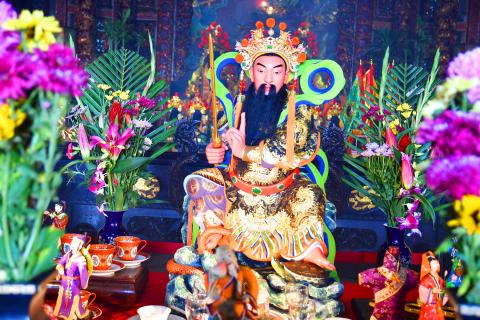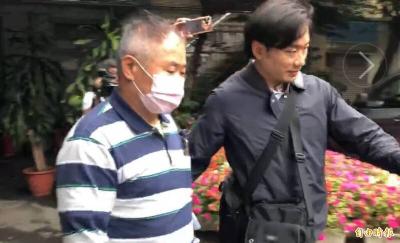In 1879, a holy man named Ke Hsiang (柯象) in what is now Yunlin County announced to his followers his imminent demise and attainment of nirvana, then turned his temple into a smoke house, forbade anyone to enter and bolted its doors from within.
More than two centuries later, Ke’s preserved corpse — still in a crossed-legged meditation posture — is the nation’s oldest mummy and is housed in National Taiwan Museum’s collection in Taipei.
It is also an object of veneration in the county’s Beiji Temple, whose tradition says that Ke was a physician from Tukuzai (土庫仔) in today’s Dapi Township (大埤), the Chinese-language online media outlet Now News reported on Sunday.

Photo: Huang Shu-li, Taipei Times
While traveling in Tainan in 1871, Ke ran into a burning house to rescue its inhabitants, but once inside, he only found an idol of the Taoist deity Xuantian Shangdi (玄天上帝, “Emperor of the Mysterious Heaven”), which he saved from the fire, the report said.
That night while asleep, Ke had a divine vision in which Xuantian Shangdi thanked him for his bravery and offered him the choice of two rewards: He could live in prosperity and glory for the remainder of his life, or he could be worshiped after his death for 10,000 generations, it said.
Ke that morning brought the statue to Tukuzai and built a temple to venerate the god until his death, it said.
Ninety-nine days after Ke’s demise, the Qing Dynasty county magistrate, who had dismissed Ke as a country charlatan, sent officials to enter the temple, but discovered Ke’s corpse “free of corruption,” which bolstered local beliefs about his divinity, the report said.
In 1912, local man Huang Chao (黃朝) plotted to rise up against Japanese colonial authorities after claiming that Ke had, via oracles, urged him to resist.
Japanese police quelled the uprising before it began and put Ke’s mummy in an evidence lockup, where it remained for 80 years, the museum said.
The resultant crackdown, which included Huang’s execution and the jailing of his coconspirators, is known as the Tuku Incident (土庫事件).
After the end of World War II, worshipers tried to locate Ke’s mummy — even going so far as searching for it at shrines throughout Japan — before discovering that the museum had kept it since its rediscovery, Now News said.
The museum in 2012 loaned the mummy to the temple. It was transported to the site under guard and with great fanfare, then returned to the museum in 2014.
The temple in January unveiled a new gilded joss paper statute of Ke Hsiang. Temple managers said they still hope that the mummy would be returned to the temple.

Taiwan would benefit from more integrated military strategies and deployments if the US and its allies treat the East China Sea, the Taiwan Strait and the South China Sea as a “single theater of operations,” a Taiwanese military expert said yesterday. Shen Ming-shih (沈明室), a researcher at the Institute for National Defense and Security Research, said he made the assessment after two Japanese military experts warned of emerging threats from China based on a drill conducted this month by the Chinese People’s Liberation Army’s (PLA) Eastern Theater Command. Japan Institute for National Fundamentals researcher Maki Nakagawa said the drill differed from the

A fugitive in a suspected cosmetic surgery fraud case today returned to Taiwan from Canada, after being wanted for six years. Internet celebrity Su Chen-tuan (蘇陳端), known as Lady Nai Nai (貴婦奈奈), and her former boyfriend, plastic surgeon Paul Huang (黃博健), allegedly defrauded clients and friends of about NT$1 billion (US$30.66 million). Su was put on a wanted list in 2019 when she lived in Toronto, Canada, after failing to respond to subpoenas and arrest warrants from the Taipei District Prosecutors’ Office. Su arrived at Taiwan Taoyuan International Airport at 5am today on an EVA Air flight accompanied by a

A 79-year-old woman died today after being struck by a train at a level crossing in Taoyuan, police said. The woman, identified by her surname Wang (王), crossed the tracks even though the barriers were down in Jhongli District’s (中壢) Neili (內壢) area, the Taoyuan Branch of the Railway Police Bureau said. Surveillance footage showed that the railway barriers were lowered when Wang entered the crossing, but why she ventured onto the track remains under investigation, the police said. Police said they received a report of an incident at 6:41am involving local train No. 2133 that was heading from Keelung to Chiayi City. Investigators

The Keelung District Prosecutors’ Office today requested that a court detain three individuals, including Keelung Department of Civil Affairs Director Chang Yuan-hsiang (張淵翔), in connection with an investigation into forged signatures used in recall campaigns. Chang is suspected of accessing a household registration system to assist with recall campaigns targeting Democratic Progressive Party (DPP) city councilors Cheng Wen-ting (鄭文婷) and Jiho Chang (張之豪), prosecutors said. Prosecutors yesterday directed investigators to search six locations, including the Chinese Nationalist Party’s (KMT) Keelung office and the residences of several recall campaign leaders. The recall campaign leaders, including Chi Wen-chuan (紀文荃), Yu Cheng-i (游正義) and Hsu Shao-yeh